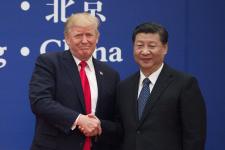The US-China Rivalry Will Continue

Whether Trump or Biden wins the election on 3. November, the rivalry between the US and China will continue because the US’s world hegemony is threatened by a rising power. The priority in both Washington and Beijing will be reinvigorating their national economies, and especially if Biden wins, their economic strategies will be ironically similar.
For European countries, it means we must not fall behind in the economic game.
Joe Biden is clearly different from Trump on the China policy. He would repair relations with allies and unite them to pressure China on human rights, intellectual property theft, forced technology transfer and unfair competition (including currency manipulation and illegal subsidies). However, Biden would avoid the Cold War-like trap of escalating conflicts, as he does not see the China challenge as a military one. Furthermore, he would seek cooperation with China on global issues like the climate, nuclear non-proliferation, and pandemics.
Apart from reviving democracy in the US, the economy is at the heart of Biden’s plan. Both Trump and Biden follow the principle of America First but with different approaches. The ‘Tariff Man’ Trump relies on shallow, unilateral tariffs to negotiate bilateral deals with China, essentially to get Beijing to buy more American products and services. The real achievement of the Phase One trade deal in January, after one and half years’ trade war, was China’s promise to buy $200 billion more from the US during 2020-2021 than the 2017 levels.
Various reviews of Trump’s trade policy conclude that he has achieved little in addressing the large trade deficit or forcing China to reform but instead hurled much pain on American workers and companies.
Chinese netizens call Trump by the nickname ‘Trump Building-the-nation (Chuan Jianguo)’ (Jianguo was a popular first name in the early years of the PRC). It means that he unintentionally helps China focus on domestic improvement and also make the Chinese people feel superior.
Trump’s transactional approach could have been easier for China, but according to US intelligence China now regards Trump as too unpredictable.
Biden’s economic plan is both more domestic and more global than Trump’s. Interestingly, various aspects of Biden’s plan mirror China’s ‘dual (domestic and international) circulation’ economic strategy, which was announced in May by Xi Jinping and will be a centerpiece in China’s next five-year plan for 2021-2025. Importantly, they are similar in the following two aspects: domestic and international.
Domestically, industrial policy will be full on under Biden to enhance the competitiveness of American industries. While Trump focuses more on the Wall Street, the rust belt and agriculture (how much he really cares about workers and farmers is a debate in America), Biden has a clear priority for cutting-edge technologies, clean energy, manufacturing, and infrastructure—the same sectors that China focuses on in the ‘domestic circulation’ strategy.
They both seek to have complete supply chains of critical goods and to be globally competitive in new technologies. Their playbooks are similar, although China has had a much more aggressive and state-centred version: investment in R&D, subsidies for national companies, government procurement of national products and services, refocus on manufacturing, and stimulating consumption.
Internationally, both Biden and Xi assert their support for global institutions and promise to keep their economies open, because both countries compete globally and seek foreign investment and talents. However, they will both reduce external reliance, and it is less clear how exactly they are going to support the WTO and their trading partners. For one, government subsidies and procurement are against the WTO principles, and the US would only be able to demand China to be transparent but will have difficulty in stopping such practices.
In short, the main theme of the US-China rivalry will be national economic competitiveness. Some call it economic nationalism. For smaller countries, it is respectable and important to fight for liberal ideals, but for a welfare state like Denmark, we cannot afford to lose out from the economic game. How well we can stay tuned in and dance to that melody will decide how well the Danish economy thrives in the decades to come. That means, we should prioritise Denmark’s economic interests, invest more in education, research and innovation, support Danish companies, improve our competitiveness and enhance consumers’ purchasing power. We should also have a deep understanding of China, the US and our competitors, as well as support and benefit from an open global market.
This is a part of the cooperation between Morgenavisen Jyllands.Posten and DIIS. The anlysis has also been published in the newspaper
DIIS Experts

